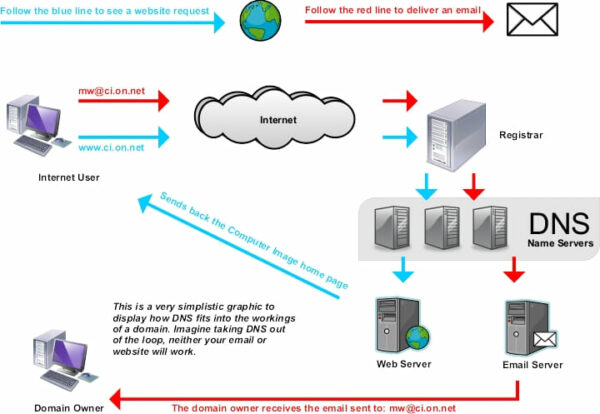In the ever-expanding realm of the internet, where every click takes you to a new destination, the Domain Name System (DNS) plays a crucial behind-the-scenes role. This guide will walk you through the ins and outs of DNS, explaining its significance, mechanics, and impact on your online interactions.
DNS Explained: A Guide to Domain Name System

Imagine the internet as a vast city with countless websites, each having a unique address. Just like you need a map to find a specific location in a city, your web browser requires a way to locate websites on the internet. This is where the Domain Name System (DNS) comes into play.
DNS serves as the internet’s address book, translating human-friendly domain names (like www.example.com) into IP addresses (such as 192.168.1.1) that computers use to identify each other on the network.
Essentially, DNS acts as a middleman, ensuring that when you type a web address into your browser, you’re directed to the correct website’s servers.
The Mechanics of DNS
Understanding the mechanics of DNS involves several key components:
DNS Servers
DNS servers are digital interpreters that facilitate the translation of domain names to IP addresses. When you enter a web address, your request is sent to a DNS resolver, which in turn queries authoritative DNS servers to fetch the correct IP address associated with the domain name.
Authoritative DNS Servers
Authoritative DNS servers store specific domain-related information. These servers are responsible for knowing which IP address corresponds to a particular domain. When a DNS resolver requests information about a domain, authoritative servers provide the answers.
Caching
To optimize speed and efficiency, DNS resolvers often store recently accessed information in their cache. This way, if multiple users request the same information, the resolver can provide it quickly without needing to query authoritative servers again.
Importance of DNS
DNS might seem like an invisible force, but its significance cannot be overstated. It’s the foundation that enables our web browsing experience to be seamless and user-friendly.
Human-Centric Browsing
DNS eliminates the need for us to remember complex IP addresses. Instead, we can type intuitive domain names, making web browsing an intuitive and user-friendly activity.
Load Balancing
Websites with high traffic use DNS to distribute the load across multiple servers. This ensures that a single server doesn’t become overwhelmed, leading to faster load times and better user experiences.
Redundancy and Reliability
By having multiple DNS servers and records, the system becomes more fault-tolerant. If one server fails, others can step in, ensuring websites remain accessible even under challenging circumstances.
How DNS Impacts You
Whether you’re a casual internet user or a website owner, DNS affects you in more ways than you might realize.
Faster Browsing
With efficient DNS resolution, websites load more quickly, enhancing your browsing experience. Quick access to DNS records means your browser spends less time searching for websites’ locations.
Secure Online Transactions
DNS plays a role in security by enabling technologies like DNSSEC (DNS Security Extensions), which helps prevent DNS spoofing and other malicious activities. This ensures your online transactions remain confidential and secure.
Online Presence
For website owners, DNS is pivotal. It’s what connects your domain name to your website’s IP address. Proper DNS configuration is essential for your site to be reachable and reliable.
FAQs
What Is the DNS Explained: A Guide to Domain Name System?
DNS, or Domain Name System, is a crucial internet infrastructure that translates user-friendly domain names into computer-readable IP addresses. This guide offers a comprehensive understanding of how DNS works, its importance, and its impact on online experiences.
How Does DNS Impact Web Browsing Speed?
DNS directly affects web browsing speed by quickly translating domain names into IP addresses. Efficient DNS resolution ensures that websites load faster, providing users with a seamless browsing experience.
Can DNS Affect Online Security?
Yes, DNS plays a vital role in online security. Technologies like DNSSEC (DNS Security Extensions) help prevent malicious activities like DNS spoofing. This ensures the security and confidentiality of online transactions and interactions.
Why Is DNS Important for Website Owners?
For website owners, DNS is crucial because it connects domain names to IP addresses, making their websites accessible online. Proper DNS configuration is essential for maintaining a reliable online presence.
How Does DNS Ensure Redundancy and Reliability?
DNS achieves redundancy and reliability through multiple DNS servers and records. If one server fails, others can step in, ensuring websites remain accessible even during server outages.
What Are Authoritative DNS Servers?
Authoritative DNS servers store specific domain-related information and provide answers to DNS resolver queries. They play a key role in translating domain names into IP addresses accurately.
Conclusion
In the ever-evolving digital landscape, the Domain Name System (DNS) stands as a silent yet powerful force that enables seamless web browsing, online transactions, and reliable website accessibility. Understanding how DNS works empowers both users and website owners to navigate the online world with confidence.
So, the next time you enter a web address, remember that behind the scenes, DNS is working tirelessly to ensure your online journey is smooth and efficient.